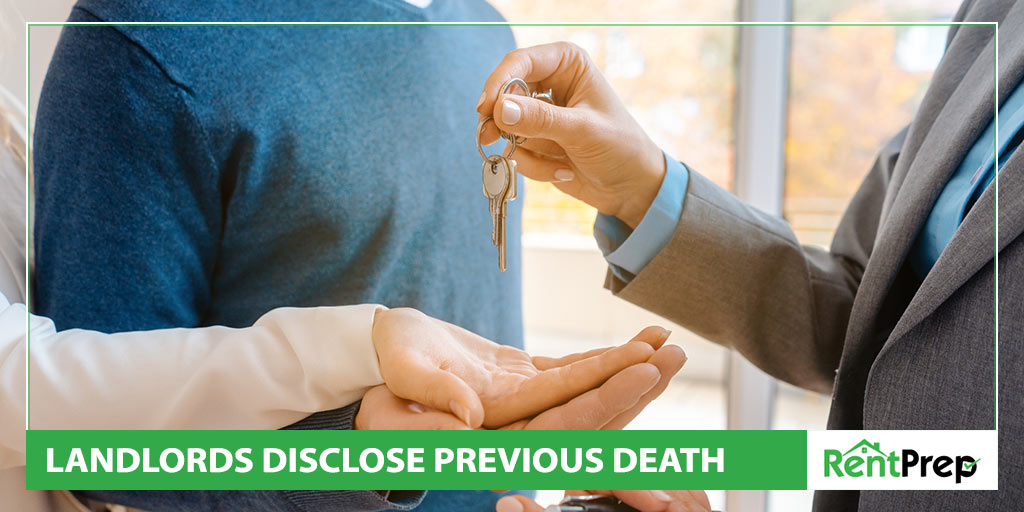
Updated May 2021
Did you know that there are certain laws about how and when landlords must disclose a previous death in a rental property? Unlike other types of disclosures, death disclosures are not frequently discussed.
Most landlords and property managers know about landlord disclosures when it comes to information about things like lead paint or mold. Some states even require landlords to disclose certain other information to prospective tenants.
But, what about a premature death on the rental property? Depending on the state or municipal law, sometimes landlords are required to disclose whether there’s been a death on the premises.
If a landlord doesn’t follow the state’s guidelines, they could face large fines and early tenancy termination, as well as other expensive problems.
Learn what information you must legally disclose about a death in order to stay in compliance with your state’s laws, before your tenant signs that lease agreement.
A Table Of Contents: Disclose A Death In House Or Rental
It’s not obvious to all landlords that they might need to disclose death in the house they plan to rent out, so it’s important to find out what the applicable laws are. Like many landlord-tenant laws, the rules on death disclosures vary by state, so landlords should take the time to get educated on their local areas.
- Should Landlords Disclose Previous Deaths At A Property?
- Does Your Landlord Have To Tell You If Someone Died?
- How To Discuss A Previous Death With Tenants
- Preparing For All Circumstances
- FAQs: Landlords Disclose Previous Death
- What Happens If Someone Dies In A Rental Property?
- Do Apartments Have To Disclose Deaths?
- Do You Need To Disclose The Death In Writing?
- What Happens If A Tenant Finds Out About A Death After They’ve Moved In?
- Are The Rules For Disclosing Death When Selling A House Different From When Renting A Property Out?
- How Can I Check If Someone Died In A House?
Should Landlords Disclose A Previous Death At A Property?
 Before we get into the legal ramifications of whether or not a death must be disclosed at a rental property, let’s talk about the choice landlords have to make about their rental units in a different way.
Before we get into the legal ramifications of whether or not a death must be disclosed at a rental property, let’s talk about the choice landlords have to make about their rental units in a different way.
Should landlords disclose previous deaths at a property even if they are not legally required to do so or is it better to leave their real estate untainted by that information?
Landlords have a lot of opinions on this topic, and it ultimately is up to each individual landlord to decide.
For the most part, giving your tenants as much information as you can about a property upfront is usually the better choice. Tenants may directly ask about this type of situation, and you should answer honestly if they do.
Even though this information might be off-putting for some tenants, there is always a chance that they will find out about the premature death later on. If they discover it later and feel that you were dishonest while marketing the property, this could lead to an uncomfortable relationship even if you didn’t break any rules.
If the death occurred within the last five years and you were the landlord at the time of the late person’s passing, it is probably a good idea to share at least vague details with prospective tenants, especially if they ask directly. Rather than risk a conflict down the line because you hid this information, be upfront and ready to respond to any concerns potential tenants may have.
The Heart Of The Matter: Psychologically Impacted Property
While the death of a tenant in a rental property doesn’t usually affect the unit’s physical condition following any necessary repairs and proper cleaning, many states recognize that there can be an emotional and psychological impact from living in such a place.
A rental property that was the location of a homicide, suicide, or other violent death can come with psychological impacts—that is, this information may cause a prospective tenant to pass on signing a lease even if there is nothing else wrong with the unit.
This can make some landlords feel as if they should not share the secrets of the property, but that decision could lead to trouble down the line. Instead, focus on finding tenants who understand that the rental unit has moved past that event.
One way to help tenants feel more comfortable is to let them know about any and all remodeling you have done on the property since the death occurred. This will refresh the property in the eyes of prospective tenants and may help you to find a tenant if the property is beginning to feel unrentable.
Does Your Landlord Have To Tell You If Someone Died On The Property?
Whether landlords must disclose issues that contribute to a property with potential psychological impacts all depends on state laws—sometimes it’s mandatory and sometimes it is not.
Unlike the federal law that requires landlords in all states to disclose the presence of lead-based paint in a unit, there are a range of state laws and regulations concerning previous deaths in rental properties.
In some states, a landlord has no duty to disclose to a potential tenant that a death occurred on the property, while other states legally require the landlord to disclose that a former occupant or renter died in the unit and even sometimes how the death occurred.
Examples Of Death Disclosures
Do you know if a death disclosure requirement exists in your state? It’s important that you take time to find out. Even if you don’t currently have any affected properties, knowing this information for the future will be beneficial for your progress as a landlord.
Because the requirements surrounding death disclosures vary so widely from state to state, here are three examples from around the country that reflect this variation:
California State Law
The California Civil Code (Cal. Civ. Code § 1710.2.) requires landlords to voluntarily disclose whether there has been a death at the rental property that occurred within the past three years.
Landlords cannot provide details about the previous tenant’s identity, job, family, or lifestyle—just that the death occurred and minimal information about the cause.
If the prospective tenant directly asks about any deaths prior to the last three years, the landlord is required to provide that information if requested, but does not have to volunteer it.
Georgia State Law
In Georgia, (O.C.G.A.§ 44-1-16), landlords and owners must answer truthfully if asked direct questions about a death on the property and must disclose whether it was a death by accidental or natural means, the site of a homicide, or whether the death was by suicide.
Unlike California, Georgia landlords do not need to volunteer the information unless asked directly by the prospective tenant, even if the death was within the last few years.
Oregon State Law
For Oregon, the law (Section 1. ORS 93.275) specifically states that landlords are not required to inform prospective tenants whether a death occurred on the property. It further clarifies that no cause of action will arise against an owner or landlord for failure to disclose the death.
State Laws Vary
As you can see, the rules about whether or not death disclosure is required vary widely. That is why it is so important to find out the specific regulations in your state. If states do not have any specific rules on the matter, it is up to your discretion whether or not to share any information.
However, conflicts with tenants over withholding information could occur later on. If you live in a state with no specific rules on this matter, most landlords choose to share at least minimal information covering the last few years only. This gives tenants some context without going overboard.
How To Discuss A Previous Death With Tenants

If you are required to discuss a previous death in a rental unit with your tenants or have chosen to share some information, you might be wondering exactly how you should go about this. After all, talking about death can be difficult and awkward for many people. Plus, there are some limits to what you should and should not say.
How can you go about discussing with prospective tenants a death that occurred at a property? These tips will help.
Answer Questions Honestly
If a tenant asks about a death they know happened at the property, or if they ask if any deaths have occurred at the property, answer honestly. You do not have to give a lot of information, but you should not deliberately lie to prospective tenants.
Don’t Give Too Many Details
Even if you know the details, don’t give too many details away. Some information, such as your former tenant’s name, job, or other details, may be protected or simply inappropriate to share.
This doesn’t mean that you need to lie. You can simply tell the prospective tenant that you cannot share private information, but you can share the basics. This will enable you to let them know if the death was an accident or violent as well as the other essentials that they are permitted to know.
Explain Improvements And Changes
Landlords who are in the unfortunate situation of dealing with the aftermath of a violent death at their rental property may have a hard time finding renters if they do not renovate and make changes.
Prospective tenants who have questions regarding previous deaths in a rental unit are likely to be more interested if you explain the improvements and changes that have been made to the property since then. This will help them see the unit as a fresh place and can limit the psychological impact of the rental’s unfortunate history.
Prepare In Advance
Are you concerned that you may have prospective tenants ask about this?
If so, it can be helpful to practice what you can say about the property, what you think is good to share, and how you will speak about the incident. Knowing in advance that prospective tenants may ask about the rental history will ensure that you are more prepared for this type of situation. Practice makes perfect, so consider what you’ll say in advance.
Send Them To The Officials
As strange as it may sound, there may come a time when prospective tenants become too curious about the history of the rental. While you should answer questions honestly, there is also a limit to what you know or what is appropriate to discuss.
If it feels like a tenant is more interested in true crime than the property itself, do not feel like you have to give them all the nitty-gritty details. Instead, direct them to the local officials and let them know they can do a public request for information there.
Depending on state laws, you are likely only required to give the bare minimum details about the death, such as whether or not it was accidental, natural, or something else. While people may be curious about deeper details, your job isn’t about telling that story.
Preparing For All Circumstances
While preparing for how to disclose a previous death at a property may seem like an uncommon situation, it’s just one of the many situations that you may find yourself in as a landlord.
One of the best ways to be prepared for unexpected situations is to have a good supply of landlord forms on hand, such as what you can find in our Landlord Form Bundle Mega Pack. Check out over 60 different forms that can make your job easier than ever before!
FAQs: Landlords Disclose Previous Death
What Happens If Someone Dies In A Rental Property?
Landlords wondering about someone passing away in a property may be dealing with a current situation. What exactly happens when someone dies in a rental property?
Once the property has been cleared for you to re-enter, it’s important to remember that a tenant’s death doesn’t automatically terminate the tenancy. This means that you cannot simply begin to empty the property and move forward; states have laws that pass tenancy over to kin in some situations.
Usually, a written notice of a tenant’s death signals a 30-day notice, but in some cases, the lease will continue until it is officially terminated. Until that time, the tenant’s estate is responsible for paying rent. Typically, the executor of the estate will be in contact with the landlord to secure the property, end the tenancy, and remove the former tenant’s items.
While family members may want to come into the rental and begin taking items away, it’s essential that you secure the deceased tenant’s personal property and keep track of anything that’s removed. Not every family member has the legal right to take belongings. It may feel awkward, but it’s important that you secure the property to prevent theft.
Once the tenancy is terminated and the property has been cleared out, you will want to analyze and return the security deposit to the tenant’s estate. From there, you can begin improving the property or looking for a new tenant as necessary.
Do Apartments Have To Disclose Deaths?
Many tenants wonder: do apartments have to disclose deaths that happened on a property before renting it out again?
The rules for apartment managers and conglomerates are going to be the same as the rules for landlords, as they are both the managing entity for the property. Just as there are state laws on whether the location of local sex offenders has to be disclosed, there are state laws about whether or not a landlord is required to disclose a death.
Most states do not permit a landlord to outright lie about a death on the property, but there are some states that go heavy on landlord protections and allow this type of information to remain hidden.
Do You Need To Disclose The Death In Writing?
Unless the state landlord tenant laws require that the death must be disclosed in writing, most of the time a verbal discussion of the unit’s history is sufficient. Every state is responsible for its specific laws about these types of incidents, however, so make sure that you check your local laws before deciding if you need to provide a written disclosure or not.
What Happens If A Tenant Finds Out About A Death After They’ve Moved In?
As long as your state’s landlord tenant laws do not require you to disclose information about deaths in your rental real property, then nothing will legally change after a tenant finds out about a death.
In many cases, however, tenants may be very uncomfortable with their new knowledge and have some questions. You should answer these questions honestly and to the degree that the law requires, but do not feel like you have to give the tenants an entire history lesson.
If a tenant wants to terminate their tenancy due to this knowledge, they will be subject to any early termination rules unless you as the landlord violated state law or the lease agreement. It is up to you to determine if you would be willing to waive any early termination penalties, but we do not recommend doing so.
Are The Rules For Disclosing Death When Selling A House Different From When Renting Out A Property?
Disclosing death when selling a house has its own set of rules separate from those that apply to rental real estate. However, most states are relatively similar in their approach to both issues. Just as some states tell landlords not to disclose deaths, sellers are often given the same guidance.
Ultimately, it will depend on state laws. Some states require that deaths within the last three years or in specific circumstances are shared, while others do not.
How Can I Check If Someone Died In A House?
If you’re feeling like you absolutely need to know if someone has died in your rental home or if you feel your landlord isn’t being truthful with you, you can check if someone has previously died on the property.
Just visit Died in House and type in your address to begin your search. We haven’t personally tried out the website, so let us know how it works for you.
Giving Notice When It’s Due
Does your landlord have to tell you if someone died on the premises? Not necessarily, but most landlord tenant relationships will be strained if a tenant finds out that their landlord lied about or withheld this type of rental history. Even if you aren’t required to give details to a tenant, it’s best to be truthful about these types of situations in order to prevent conflict later on.
It may feel strange to think about, but many people die naturally in their homes. This means that real estate across the country has this history, and it is not something that needs to be scary or problematic. For that reason, it’s important to be prepared to talk about it with tenants when necessary.
Have you ever been asked by an applicant about deaths on your rental property? Did the answer make a difference in whether they rented from you or not?
Share this article and let us know in the comments below!

